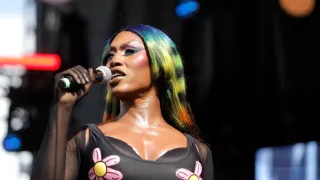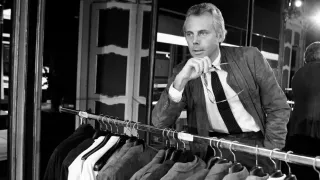
3 hours ago
Social Media Star and ‘King of Gay Rap’ Rolling Ray Dies at 28
READ TIME: 3 MIN.
Rolling Ray, a pioneering figure in social media and LGBTQ+ entertainment, died at age 28 on September 3, 2025, just before his 29th birthday. His mother, Sazola Nay, confirmed the news in an emotional post on Facebook, stating, "It is with a heavy heavy heart that I let you know that my son Ray Ray iamrollingray has gone home to be with the Lord… I thank everyone who has called or texted, this is going to be a long road" . The cause of death has not been made public as of this writing.
Raymond Harper, known professionally as Rolling Ray, was renowned for his unfiltered online persona, viral moments, and his contributions to the visibility of LGBTQ+ people—especially Black and disabled members of the community. Rolling Ray often referred to himself as the "king of gay rap," and his influence spanned music, reality television, and the digital landscape .
Rolling Ray first garnered widespread attention through his bold and humorous videos on social media platforms, quickly amassing a large following. His viral catchphrases and unapologetic self-expression turned him into a household name among younger audiences and the LGBTQ+ community .
Ray's reach extended to mainstream media with appearances on MTV’s "Catfish: Trolls," the syndicated court show "Divorce Court," and the LGBTQ+ reality dating series "Bobby I Love You, Purrr." In each of these spaces, he was celebrated for his authenticity and his ability to challenge stereotypes, particularly around sexuality, disability, and Black identity .
Rolling Ray’s presence as a Black, openly gay, and disabled public figure was groundbreaking. He often spoke candidly about his experiences as a wheelchair user, advocating for greater representation and inclusion in entertainment and society. His music and online persona embraced his intersectional identity—sending a clear message of self-love and resilience to those who rarely saw themselves reflected in popular culture .
Ray’s outspoken nature and ability to address difficult topics with humor and candor won him both admirers and detractors, but his impact on LGBTQ+ visibility was undeniable. Many fans and fellow artists credited him with helping to normalize diverse expressions of gender, sexuality, and ability in the digital age .
Following the announcement of his passing, tributes poured in across social media platforms from fans, friends, and prominent figures in the LGBTQ+ community. Many highlighted Ray’s courage in living authentically and encouraging others to do the same. Hashtags such as #LongLiveRollingRay and #KingOfGayRap began trending, as users shared favorite moments and memories of Ray’s sharp wit and fearlessness .
LGBTQ+ organizations also acknowledged his legacy. Community leaders noted that while Ray was often known for his humor and internet feuds, he also used his platform to address bullying, discrimination, and the challenges faced by queer people of color and people with disabilities .
Rolling Ray’s career was not without controversy, but his willingness to navigate public life with vulnerability and transparency resonated with those seeking authenticity in a digital world. He frequently addressed his critics directly and transformed online adversity into moments of self-empowerment and advocacy .
He leaves behind a complex legacy: as a barrier-breaker for LGBTQ+ and disabled creators in entertainment, and as a symbol of unapologetic self-love. Rolling Ray's story is a testament to the power of visibility and the importance of embracing all facets of identity. His influence is expected to endure through both his digital footprint and the countless lives he inspired to live authentically.
As the LGBTQ+ community mourns his loss, Rolling Ray’s journey from internet sensation to cultural icon will continue to shape the conversations around representation and resilience for years to come.






